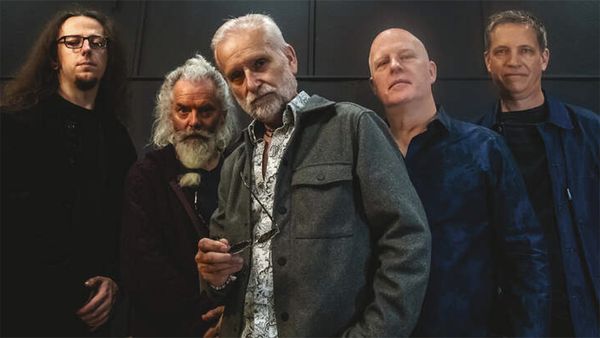
20. The Big Three Killed My Baby (1999)
Not, as one might initially assume, a reference to the Merseybeat band from noted scholar of 60s obscurity Jack White, but a rare White Stripes protest song (of sorts), decrying the US automobile industry’s penchant for engineering planned obsolescence in cars. Perhaps more importantly: mammoth, sludgy, distorted and thoroughly electrifying sound.
19. Hello Operator (2000)
The roots of Hello Operator lie, improbably enough, in a vaguely dirty American schoolyard rhyme, although it’s taken somewhere noticeably different here, alas excerpting the line about a 40-acre bra. Note also a rare guest appearance on a White Stripes track by former Hentchman and Detroit Cobra John Szymanski , blowing a mean, distorted harmonica.
18. In the Cold, Cold Night (2003)
As it’s Meg White’s 50th birthday, it seems only right to honour her finest moment not as the White Stripes’ drummer, but their vocalist: her voice brings a stark, unaffected quality – at odds with her, ahem, brother’s deliberately mannered vocal approach – to a song that deals in muted guitars and hushed snatches of keyboard.
17. Truth Doesn’t Make a Noise (2000)
Jack White is famously a man with a bit of a temper, which boils underneath Truth Doesn’t Make a Noise: “The way you treat her fills me with rage and I want to tear apart the place”. It’s a mood somehow amplified by the relatively restrained, acoustic guitar-driven sound.
16. My Doorbell (2005)
Somewhere under the guitar heroics, the costumes and the myth-building tall tales, Jack White had a keen pop sensibility. It was never more obvious than on the ultra-catchy My Doorbell, a song you could easily have imagined Paul McCartney rocking up to a late 60s Beatles session bearing.
15. Screwdriver (1999)
At heart, the White Stripes were an electric blues band, albeit an electric blues band with a conceptual aesthetic: at once pared-down and pumped-up. You can hear both aspects in Screwdriver’s ferocious dynamic shifts – moments when literally the only sound is the buzz of Jack White’s amplifier next to moments of bludgeoning power.
14. I Fought Piranhas (1999)
A highlight of their eponymous debut, and another song that feels intriguingly McCartney-esque, while also demonstrating Jack White’s innate abilities as a blues guitarist: the shivering slide playing lends an authentically spooky, haunted quality to I Fought Piranhas’ saga of striving against the odds.
13. Offend in Every Way (2001)
The musical equivalent of White Blood Cells’ cover – which literally depicted Jack and Meg White recoiling for the attentions of the press – Offend in Every Way was an early sign of the duo’s discomfort with celebrity. Ironically, set to the kind of melody that seemed to guarantee the duo would become bigger still.
12. Hotel Yorba (2001)
A joy from start to finish, Hotel Yorba is possessed of a carefree spirit that was noticeably harder to find on the White Stripes’ fraught later albums: driven by acoustic guitar, the chorus is essentially a campfire singalong, its visions of domestic bliss witty and enchanting in equal measure.
11. We’re Going to Be Friends (2001)
A rare rock song about school that isn’t a complaint, We’re Going to Be Friends is genuinely delightful and strangely moving: a tumble of childhood memories – “we don’t notice any time pass, we don’t notice anything” is a lovely evocation of pre-teen wonder – set to a delicate acoustic guitar figure.
10. The Denial Twist (2005)
Prickly, defensive, accusatory in tone, Get Behind Me Satan was the White Stripes’ uncomfortable response to mega-fame and all that came with it. It’s not the easiest album to love, but The Denial Twist is just fantastic: piano-led, infectious, lighter in tone than the songs that surrounded it, it’s a moment of pure joy.
9. Icky Thump (2007)
Inspired by Jack White mishearing the slang of then-wife Karen Elson’s Oldham childhood, decorated with a distorted organ, boasting one of his most bug-eyed and unhinged-sounding vocals, and a whiff of Captain Beefheart in its jarring changes. “Why don’t you kick yourself out? You’re an immigrant too” is a killer line.
8. Apple Blossom (2000)
Amid the attention-grabbing distorted guitar frenzy, from the start the White Stripes also had a sideline in songs that were delightfully sweet – but never sickly. Apple Blossom is the finest example: lyrics filled with charming homespun wisdom – “put your troubles in a little pile” – plus a melody the Turtles could have had a hit with.
7. The Air Near My Fingers (2003)
One of the really striking things about the White Stripes was their uncanny ability to make something fresh out of rock’s most familiar ingredients: the riff of The Air Near My Fingers is essentially Wild Thing re-written, the stuff of every teenage garage band rehearsal, and yet it’s incredible.
6. The Hardest Button to Button (2001)
A masterclass in brooding menace, with a side-order of Who Do You Love?-ish lyrical myth building – you cured your kid’s toothache with a voodoo doll? Also: forget the kvetching of her cloth-eared detractors – go back to your Yes albums, hippies! – Meg White’s drumming on this track is fantastic.
5. Seven Nation Army (2003)
Over-familiar after 21 years, Seven Nation Army has been repurposed as everything from a sports anthem to an accompaniment to political sloganeering – “ohhh, Je-re-my Corrrr-bin” etc. But there’s a reason it became ubiquitous: that riff, which somehow sounds like it always existed, is the kind of thing you hit upon once in a career.
4. Black Math (2003)
The fact that it kicks off with the White Stripes’ biggest song shouldn’t overshadow Elephant’s multitude of other delights: Black Math may not have attained the kind of broad cultural impact of Seven Nation Army, but its churning guitar, shifts in tempo and keening solo are the potent distilled essence of mid-period White Stripes.
3. Fell in Love With a Girl (2001)
The world didn’t want for garage-rock knock-offs in the early 00s, but a 21st century garage rock track that genuinely bears qualitative comparison with the best stuff on Nuggets or Pebbles was harder to find. Here it is: 1:50 of frantic, fat-free, sexual frustration, the Psychotic Reaction or Psycho of its age.
2. Ball and Biscuit (2003)
If you want evidence that Jack White was his era’s pre-eminent example of that most old-fashioned of things, a guitar hero, then Ball and Biscuit provides a particularly thrilling example: it’s all about the way the squealing, edge-of-chaos soloing that first punctuates the vocals, then consumes the final half of the song completely.
1. Dead Leaves and the Dirty Ground (2001)
There’s something impressively uncompromising about Dead Leaves and the Dirty Ground’s position as the opening track on White Blood Cells: as if to test their burgeoning fanbase, the White Stripes’ mainstream commercial breakthrough commences not with one of its poppier tracks, but three minutes of darkly glowering, feedback-laden sludgy blues. But Dead Leaves and the Dirty Ground is just incredibly exciting: there’s an audible swagger to its explosive surges – the sound of a band who are abundantly aware how special they are – and the lyrical protestations of undying love carry a weird creepiness (“every breath that’s in your lungs is a tiny little gift to me”). It couldn’t be the work of anyone else.
This article was filed before journalists at the Guardian and Observer went on a 48-hour strike in protest at the proposed sale of the Observer newspaper to Tortoise Media.










